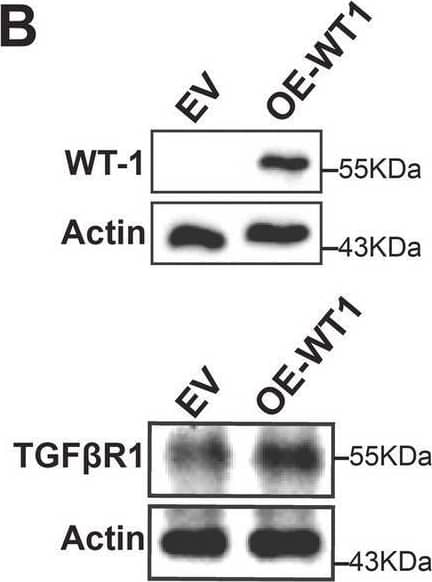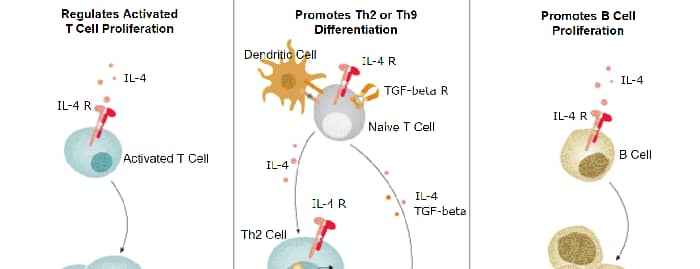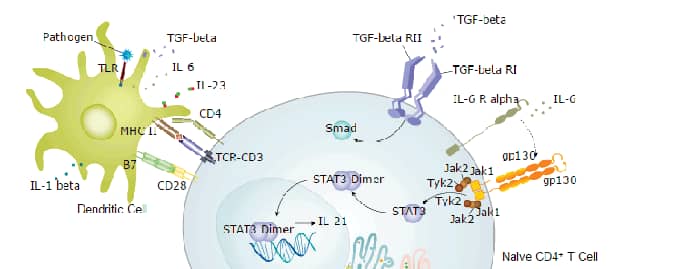Human TGF-beta RI/ALK-5 Antibody Summary
Leu34-Glu125
Accession # P36897
Applications
This antibody functions as an ELISA detection antibody when paired with Mouse Anti-Human TGF‑ beta RI/ALK‑5 Monoclonal Antibody (Catalog # MAB3025).
This product is intended for assay development on various assay platforms requiring antibody pairs.
Please Note: Optimal dilutions should be determined by each laboratory for each application. General Protocols are available in the Technical Information section on our website.
Scientific Data
 View Larger
View Larger
Detection of Human TGF‑ beta RI/ALK‑5 by Western Blot. Western blot shows lysates of HeLa human cervical epithelial carcinoma cell line, HepG2 human hepatocellular carcinoma cell line, and Raji human Burkitt's lymphoma cell line. PVDF membrane was probed with 0.2 µg/mL of Goat Anti-Human TGF-beta RI/ALK-5 Antigen Affinity-purified Polyclonal Antibody (Catalog # AF3025) followed by HRP-conjugated Anti-Goat IgG Secondary Antibody (Catalog # HAF019). Specific bands were detected for TGF-beta RI/ALK-5 at approximately 50 & 56 kDa (as indicated). This experiment was conducted under reducing conditions and using Immunoblot Buffer Group 1.
 View Larger
View Larger
TGF-beta RI/ALK‑5 in Human PBMCs. TGF-beta RI/ALK-5 was detected in immersion fixed human peripheral blood mononuclear cells (PBMCs) stimulated with LPS and monensin using Goat Anti-Human TGF-beta RI/ALK-5 Antigen Affinity-purified Polyclonal Antibody (Catalog # AF3025) at 10 µg/mL for 3 hours at room temperature. Cells were stained using the NorthernLights™ 557-conjugated Anti-Goat IgG Secondary Antibody (yellow; Catalog # NL001) and counter-stained with DAPI (blue). View our protocol for Fluorescent ICC Staining of Non-adherent Cells.
 View Larger
View Larger
Detection of Porcine TGF-beta RI/ALK-5 by Western Blot Myostatin signaling in longissimus dorsi muscle of low-birth-weight (LBWT) and normal-birth-weight (NBWT) neonatal pigs. (A): Representative western blots from four pairs of LBWT and NBWT pigs (N, NBWT; L, LBWT). (B–G): Protein abundance of myostain, ALK5 and ActRIIB, and protein abundance phosphorylation of smad2/3. Abundance was normalized to alpha -tubulin and phosphorylation normalized to the corresponding non-phospho-proteins. Results are means ± SE. n = 12. Values with different letters differ significantly (P ≤ 0.05). Image collected and cropped by CiteAb from the following publication (https://journal.frontiersin.org/article/10.3389/fphys.2017.00482/full), licensed under a CC-BY license. Not internally tested by R&D Systems.
 View Larger
View Larger
Detection of TGF-beta RI/ALK-5 by Western Blot WT1 regulates the STAT1/3 pathway in CAFs. A Protein levels of WT1, STAT1, STAT3, PD-L1 and the TGF beta receptor were determined in WT1 knockdown (A) and WT1 overexpressed (B) CAFs by Western blotting. Actin was used as a loading control. IDO release was determined by ELISA. RNA levels of PD-L1 was determined by qRT-PCR. TBP was used as a loading control. Representative experiment is shown of n = 3–5 biological replicates. Data represents mean ± SEM; * P < 0.05, ** P < 0.01, *** P < 0.001, and **** P < 0.0001 Image collected and cropped by CiteAb from the following open publication (https://pubmed.ncbi.nlm.nih.gov/40598415), licensed under a CC-BY license. Not internally tested by R&D Systems.
Reconstitution Calculator
Preparation and Storage
- 12 months from date of receipt, -20 to -70 °C as supplied.
- 1 month, 2 to 8 °C under sterile conditions after reconstitution.
- 6 months, -20 to -70 °C under sterile conditions after reconstitution.
Background: TGF-beta RI/ALK-5
TGF-beta RI, also known as activin-like kinase 5 (ALK-5), is a 55 kDa type I transmembrane serine/threonine receptor kinase. It is ubiquitously expressed and forms a functional heterotetrameric signaling TGF-beta receptor complex with TGF-beta RII. The amino acid sequence of human TGF-beta RI extracellular domain is 91%, 90%, 91%, and 93% identical to that of porcine, mouse, bovine, and rat TGF-beta RI, respectively.
Product Datasheets
Citations for Human TGF-beta RI/ALK-5 Antibody
R&D Systems personnel manually curate a database that contains references using R&D Systems products. The data collected includes not only links to publications in PubMed, but also provides information about sample types, species, and experimental conditions.
16
Citations: Showing 1 - 10
Filter your results:
Filter by:
-
MicroRNA‑133b targets TGF beta receptor I to inhibit TGF‑ beta ‑induced epithelial‑to‑mesenchymal transition and metastasis by suppressing the TGF‑ beta /SMAD pathway in breast cancer
Authors: Shengjie Wang, Mingliang Huang, Zichen Wang, Wan Wang, Zhiyuan Zhang, Shuting Qu et al.
International Journal of Oncology
-
Inhibition of TGF-beta 1 Signaling by IL-15: A Novel Role for IL-15 in the Control of Renal Epithelial-Mesenchymal Transition: IL-15 Counteracts TGF-beta 1-Induced EMT in Renal Fibrosis
Authors: Aurore Devocelle, Lola Lecru, Hélène François, Christophe Desterke, Cindy Gallerne, Pierre Eid et al.
International Journal of Cell Biology
-
Downregulated Translation Initiation Signaling Predisposes Low-Birth-Weight Neonatal Pigs to Slower Rates of Muscle Protein Synthesis
Authors: Y Chen, SR McCauley, SE Johnson, RP Rhoads, SW El-Kadi
Front Physiol, 2017-07-11;8(0):482.
-
Oocytes and hypoxanthine orchestrate the G2-M switch mechanism in ovarian granulosa cells
Authors: Chengyu Li, Xueqin Meng, Shuo Liu, Weijian Li, Xue Zhang, Jilong Zhou et al.
Development
-
Role of gastric epithelial cell-derived transforming growth factor beta in reduced CD4+ T cell proliferation and development of regulatory T cells during Helicobacter pylori infection
Authors: Ellen J. Beswick, Iryna V. Pinchuk, Rachel B. Earley, David A. Schmitt, Victor E. Reyes
Infection and Immunity
-
Induction of Reactive Bone Stromal Fibroblasts in 3D Models of Prostate Cancer Bone Metastases
Authors: Windus, LCE;Matigian, N;Avery, VM;
Biology
Species: Human
Sample Types: Cell Lysates, Whole Cells
Applications: ICC, Western Blot -
Mitochondrial dysfunction induces ALK5-SMAD2-mediated hypovascularization and arteriovenous malformations in mouse retinas
Authors: H Zhang, B Li, Q Huang, F López-Girá, Y Tanaka, Q Lin, S Mehta, G Wang, M Graham, X Liu, IH Park, A Eichmann, W Min, JH Zhou
Nature Communications, 2022-12-10;13(1):7637.
Species: Mouse
Sample Types: Tissue Lysates
Applications: Western Blot -
Growth differentiation factor 1-induced tumour plasticity provides a therapeutic window for immunotherapy in hepatocellular carcinoma
Authors: W Cheng, HL Li, SY Xi, XF Zhang, Y Zhu, Le Xing, YX Mo, MM Li, FE Kong, WJ Zhu, XG Chen, HQ Cui, ZM Cao, YF Gong, YQ Tang, Y Zhang, XY Guan, NF Ma, M Liu
Nature Communications, 2021-12-08;12(1):7142.
Species: Human
Sample Types: Cell Lysates
Applications: Western Blot -
TGF&beta1 Suppressed Matrix Mineralization of Osteoblasts Differentiation by Regulating SMURF1-C/EBP&beta-DKK1 Axis
Authors: B Nam, H Park, YL Lee, Y Oh, J Park, SY Kim, S Weon, SH Choi, JH Yang, S Jo, TH Kim
International Journal of Molecular Sciences, 2020-12-21;21(24):.
Species: Human
Sample Types: Protein
Applications: Western Blot -
POH1 contributes to hyperactivation of TGF-? signaling and facilitates hepatocellular carcinoma metastasis through deubiquitinating TGF-? receptors and caveolin-1
Authors: B Wang, X Xu, Z Yang, L Zhang, Y Liu, A Ma, G Xu, M Tang, T Jing, L Wu, Y Liu
EBioMedicine, 2019-02-07;0(0):.
Species: Human
Sample Types: Cell Lysates
Applications: Western Blot -
MDM2 promotes epithelial-mesenchymal transition and metastasis of ovarian cancer SKOV3 cells.
Authors: Ying Chen, Dan-Dan Wang, Ye-Ping Wu, Dan Su, Tian-Yi Zhou, Ren-Hua Gai, Ying-Ying Fu, Lin Zheng, Qiao-Jun He, Hong Zhu, Bo Yang
British Journal of Cancer, 2017-08-17;0(0):1532-1827.
Species: Human
Sample Types: Cell Lysates
Applications: Western Blot -
Key role of the endothelial TGF-beta/ALK1/endoglin signaling pathway in humans and rodents pulmonary hypertension.
Authors: Gore B, Izikki M, Mercier O, Dewachter L, Fadel E, Humbert M, Dartevelle P, Simonneau G, Naeije R, Lebrin F, Eddahibi S
PLoS ONE, 2014-06-23;9(6):e100310.
Species: Human
Sample Types: Cell Lysates
Applications: Western Blot -
MiR-142-3p represses TGF-beta-induced growth inhibition through repression of TGFbetaR1 in non-small cell lung cancer.
Authors: Lei Z, Xu G, Wang L, Yang H, Liu X, Zhao J, Zhang H
FASEB J, 2014-02-20;28(6):2696-704.
Species: Human
Sample Types: Cell Lysates
Applications: Western Blot -
Activin-like kinase receptor 1 (ALK1) in atherosclerotic lesions and vascular mesenchymal cells.
Authors: Yao Y, Zebboudj AF, Torres A, Shao E, Bostrom K
Cardiovasc. Res., 2006-09-27;74(2):279-89.
Species: Human
Sample Types: Cell Lysates, Whole Cells
Applications: ICC, Western Blot -
Analysis of the interacting partners of the neuronal calcium-binding proteins L-CaBP1, hippocalcin, NCS-1 and neurocalcin delta.
Authors: Haynes LP, Fitzgerald DJ, Wareing B, O'Callaghan DW, O&apos;Callaghan DW, Morgan A, Burgoyne RD
Proteomics, 2006-03-01;6(6):1822-32.
Species: Bovine
Sample Types: Tissue Homogenates
Applications: Western Blot -
Selective extracellular vesicle exclusion of miR-142-3p by oral cancer cells promotes both internal and extracellular malignant phenotypes
Authors: Christopher T.D. Dickman, James Lawson, James Jabalee, Sara A. MacLellan, Nancy E. LePard, Kevin L. Bennewith et al.
Oncotarget
FAQs
No product specific FAQs exist for this product, however you may
View all Antibody FAQsReviews for Human TGF-beta RI/ALK-5 Antibody
Average Rating: 5 (Based on 2 Reviews)
Have you used Human TGF-beta RI/ALK-5 Antibody?
Submit a review and receive an Amazon gift card.
$25/€18/£15/$25CAN/¥75 Yuan/¥2500 Yen for a review with an image
$10/€7/£6/$10 CAD/¥70 Yuan/¥1110 Yen for a review without an image
Filter by:





